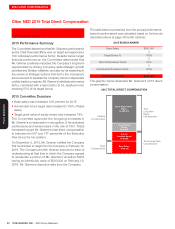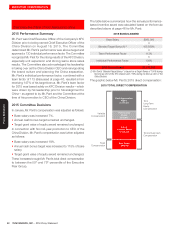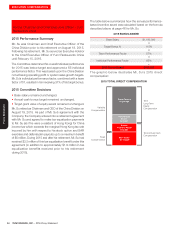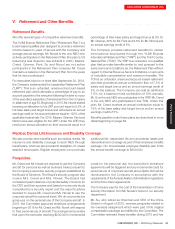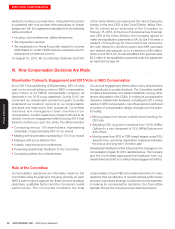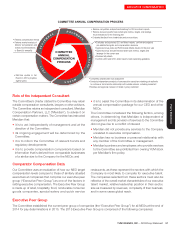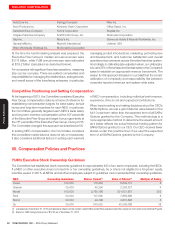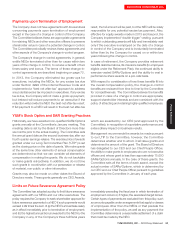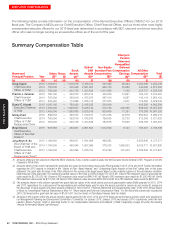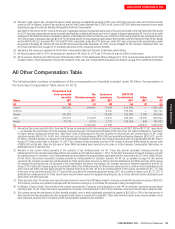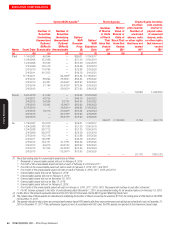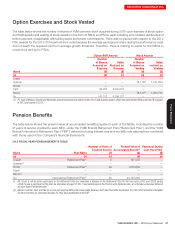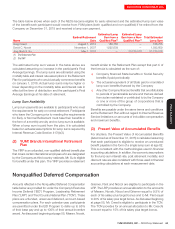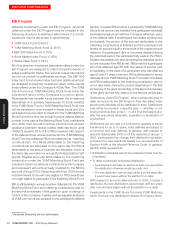Pizza Hut 2015 Annual Report Download - page 74
Download and view the complete annual report
Please find page 74 of the 2015 Pizza Hut annual report below. You can navigate through the pages in the report by either clicking on the pages listed below, or by using the keyword search tool below to find specific information within the annual report.
YUM! BRANDS, INC.-2016Proxy Statement60
Proxy Statement
EXECUTIVE COMPENSATION
Compensation Recovery Policy
Pursuant to the Company’s Compensation Recovery Policy
(i.e., “clawback”), the Committee may require executive
officers (including the NEOs) to return compensation paid
or may cancel any award or bonuses not yet vested or
earned if the executive officers engaged in misconduct or
violation of Company policy that resulted in significant
financial or reputational harm or violation of Company policy,
or contributed to the use of inaccurate metrics in the
calculation of incentive compensation. Under this policy,
when the Board determines that recovery of compensation
is appropriate, the Company could require repayment of
all or a portion of any bonus, incentive payment, equity-
based award or other compensation, and cancellation of
an award or bonus to the fullest extent permitted by law.
Hedging and Pledging of Company Stock
Under our Code of Conduct, no employee or director is
permitted to engage in securities transactions that would
allow them either to insulate themselves from, or profit from,
a decline in the Company stock price. Similarly, no employee
or director may enter into hedging transactions in the
Company’s stock. Such transactions include (without
limitation) short sales as well as any hedging transactions
in derivative securities (e.g. puts, calls, swaps, or collars)
or other speculative transactions related to YUM’s stock.
Pledging of Company stock is also prohibited.
Deductibility of Executive Compensation
The provisions of Section 162(m) of the Internal Revenue
Code limit the tax deduction for compensation in excess
of $1 million paid to certain NEOs. Performance-based
compensation is excluded from the limit, however, so long
as it meets certain requirements. The Committee intends
that the annual bonus, SARs/Options, RSU and PSU awards
satisfy the requirements for exemption under Internal Revenue
Code Section 162(m).
For 2015, the annual salary paid to Mr.Creed exceeded
$1 million. The other NEOs were in each case paid salaries
of $1 million or less, except for Mr.Su whose salary exceeded
$1 million; however, the Committee noted that Mr.Su’s
compensation is not subject to United States tax rules and,
therefore, the $1 million limitation does not apply in his case.
The 2015 annual bonuses were all paid pursuant to our
annual bonus program and, therefore, we expect will be
deductible. For 2015, the Committee set the maximum
individual award opportunity based on a bonus pool for the
CEO and the next two highest paid executive officers, other
than Messrs. Creed, Su and Grismer. (Mr.Grismer is not
included for purposes of our pool since under IRS rules the
Chief Financial Officer is not subject to these limits.) The
bonus pool for 2015 was equal to 1.5% of operating profit
(adjusted to exclude special items believed to be distortive
of consolidated results on a year-over-year basis — these
are the same items excluded in the Company’s annual
earnings releases). The maximum payout opportunity for
each executive was set at a fixed percentage of the pool.
Based on the Company’s operating profit, before special
items of $2.0 billion, the bonus pool was set at approximately
$30 million and the maximum 2015 award opportunity for
each NEO was based on their applicable percentage of the
pool (Mr.Creed=30%, Mr.Novak=20%, Mr.Pant=20% and
Mr.Niccol=10% and Mr.Su=10%), (Under the terms of the
shareholder approved plan no executive may earn a bonus
in excess of $10 million for any year.) The Committee then
exercised its discretion in determining actual incentive
awards based on team performance and individual
performance measures as described above.
Due to the Company’s focus on performance-based
compensation plans, we expect most compensation paid
to the NEOs to continue to qualify as tax deductible, but
the Committee may approve compensation that is not
deductible under 162(m).


